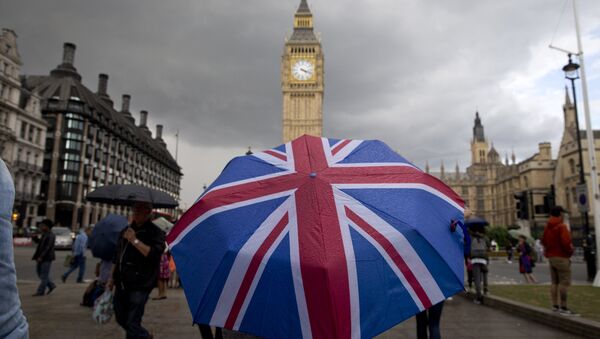“We have the option of a fiscal response, and we will do that on our normal timetable around the autumn statement,” Hammond said in July. To his mind, private sector performance figures “underscore the hit to confidence from the uncertainty that the referendum decision has created.”
Despite adding to the pressure on the budget, the idea of a higher level of infrastructure expenditures hardly meets any opposition on Downing Street. All this planning, however, has only become feasible after the cabinet largely abandoned its initial target of achieving a non-deficit yearly budget by 2020 in the light of the Bank of England’s (BOE) monetary policy insufficiency, ensuring a sustainably fast pace of economic expansion.
The Tory cabinet that had ruled since 2010 had been coherent in their effort to turn yearly budget deficits into surpluses by 2020, gradually narrowing the deficit gap over the past six years under PM David Cameron. However, Theresa May's new government, formed after Cameron resigned in the wake of the ‘Out’ vote in the Brexit referendum, is eyeing a ‘fiscal reset’. The plan is to boost economic growth while slowing the narrowing of the deficit gap for a year or two, in order to achieve a fiscal surplus later, on the heels of quicker economic growth.
According to data from the Office of National Statistics (ONS), corporate tax revenues collected in July were the strongest since 2011, at £7.5 bln. Such dynamics allow for a decrease in corporate tax, and even though the British government has not yet directly hinted at such a possibility, the UK’s current competitors in the EU are wary of such steps, boosting Britain’s investment appeal and providing the Kingdom with an additional competitive edge, aside from the already-depreciated pound sterling.
“You hear about plans in the UK to, for example, lower corporate taxes considerably. If they, during this time, begin that kind of race, that will of course make discussions more difficult,” Swedish Prime Minister Stefan Loefven said.
Currently, corporate tax is 20% in the UK compared to Sweden’s 22%. Levels of taxation are typically higher in the EU, and the UK’s effort to boost its competitiveness via tax breaks could disinvest the European mainland.
Chancellor Hammond, however, said he will not reveal any particular fiscal planning until the Autumn Statement, to be delivered closer to yearend.
What the Exchequer could possibly do to immediately spur the economy from the current year-on-year growth rate of 2.2%, are: lower the taxes on the corporate sector, cut the value-added tax (VAT) to boost consumption (which drives some 79% of the UK’s GDP), introduce new tax deduction schemes, as well as expand the taxable base by considering less income taxable. On the expenditures end, the government will likely boost investment in infrastructure, as suggested by the shadow cabinet, resulting in new jobs and payrolls, ultimately driving expansion in the open market.
According to estimates provided by Capital Economics, the total volume of fiscal stimulus might reach £5 bln per year, while the budget deficit would be roughly 30% above the current projections by spring 2018.
Meanwhile, the BOE, who have already cut rates and expanded monetary stimulus for their part, are seemingly welcoming of the idea of full-scale fiscal stimulus.
“The bank is in a much more constrained position in a world where monetary policy is likely to be less effective,” Charles Bean, ex-deputy governor for monetary policy, said.A lower VAT, in turn, could boost consumer spending, pushing both inflation and economic growth higher. Currently at 20% since 2010, the VAT reduction could prove to be a costly measure in terms of the budget, yet efficient in terms of propelling broader growth. In 2008, a 2.5% VAT reduction was estimated at having cost the budget some £12 bln per year.
Thus far, Hammond has reiterated the idea of achieving a yearly budget surplus hasn't been abandoned, merely postponed.





